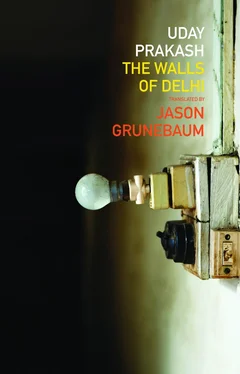No matter how bad things were, they could be worse. The shacks and makeshift houses of hundreds of thousands of people living in Delhi were very quietly, very secretively being set ablaze, their whole life reduced to ash. Or bulldozers were sent to destroy the houses, running them over until nothing was left but rubble. The people who lived there, poor and without work, were chased away. All ‘revolutionary organisations’ or cultural institutions were packed with developers, real estate agents, gentrifiers, high-ranking police officers, professors, intellectuals, commission men, all of whom banded together as one to starve to death anyone who dared describe what was going on.
I had been without a real job for fifteen years. I had degrees, important awards, job experience, good qualifications, but no matter what I applied for, I got turned down. The person they hired would be less educated, less experienced, but with good connections, ones in high places. A corrupt force had been spawned, and people like me could get nowhere near it.
I was down, very down, and sinking into despair.
I think another week must have gone until I was able to see them in Jahangirpuri. The road to get to house number E-3/1, bylane number seven, had changed. New buildings were under construction. Everything around was being torn down. Chandrakant told me that lots of people from the area were being evicted and sent to Bhilswa. They heard that a water theme park was going to be built in Jahangirpuri where all the rich kids in Delhi could enjoy their vacations swimming, splashing, snacking, horsing around, having a good time. He told me that he had put down one hundred thousand and taken out a loan for another two hundred for a third-floor public housing flat under construction in phase four of Ashok Vihar. It was a block of four-story apartment buildings for low-income residents. Chandrakant held the utmost gratitude towards his boss, Gulshan Arora, without whom this wouldn’t have been possible. I thought to myself that Arora had probably also given him the money because it would be nearly impossible to find as honest and reliable a worker as Chandrakant. If he were forced to leave the half flat and move to another part of Delhi altogether, it would be impossible for him to continue working at Arora’s shop.
My eyes lit on Suri. He had given me a big smile upon my arrival, sitting next to his newborn brother Amarkant, his heavy head wobbling up and down, planting little kisses on his brother and waving a torn rag in the air to chase off the flies. Shobha did not light the little coal stove: she made my tea on her new electric hot plate, my favourite kind of chai, steeped for a long time and very strong, with cardamom and ginger. And with so much sugar a diabetic wouldn’t get near it with a ten foot pole. EXPLODING COLOURS IN THE DARK AND THE MAGIC OF THE CARPET
It was only because I came to visit that Chandrakant had taken the day off. It was getting close to five, and it wouldn’t be long before night covered everything. The shadows of tall buildings slowly engulfed the little houses and bylanes of Jahangirpuri. The dark shadows from outside fell no less heavily on Chandrakant’s family and me. I wanted to return home as soon as possible, but there was no way Chandrakant or Shobha were going to let me leave. It had been a long time — many years — since they spent days like these. It was the first time they were able to buy a place, their own home; at the ripe age of fifty, Shobha’s giving birth to Amarkant, and, proving wrong the all-but-certain prognosis, was like the impossible made possible, as was the continuous, still-in-progress life of their firstborn, Suryakant.
Chandrakant took out a bottle of rum he had bought — Old Monk. He’d also bought a kilo of mutton he had chosen himself and had wrapped up from the Indian Halal Meat Shop: chops, thighs, rump, and legs, along with a container of fried-boiled spicy channa with green chilies, lemon juice, coriander, haripatti, covered with thinly sliced onion.
‘Tonight we’re making mutton Kohalpuri for you. If it’s too spicy you can wipe your face with a handkerchief,’ Shobha chirped from beside her little stove, where the spices were browning in the pressure cooker. ‘You’ll never forget that once in your life you ate food cooked by Shobha!’ She understood completely my darkness and despair. They wanted to share a little shining sliver of the good fortune and happiness they had found after so many years with me. And I was truly grateful.
‘Hey Chandu, don’t forget to pour a glass for me. As soon as I put the lid on this I’ll come over and sit with you two,’ Shobha said, then began to hum.
Giving birth to Amarkant, it was as if Shobha had sloughed off ten years off her body. Joy and hope had erased the lines on her face, the ones that years of struggle, deprivation, sorrow, poverty, and Suryakant’s imminent death had carved in her face. Her eyes shone with the brilliance of a whole, free woman, and she radiated with every step. In the light of the forty watt bulb and glow from the stove, Shobha looked in that cramped little half flat like a young girl who had come directly from bathing in a cheery mountain waterfall. Her radiance and beauty right then gave off an energy that pulled my heartache and despair out of me, while pulling me toward her at an extremely high velocity.
I don’t feel bashful and I’m not afraid to say that that night, I wanted to drown myself in Shobha’s beauty and elation. Maybe some dormant animal lay inside me that had been lying ill in a corner, drowsy, tired and defeated, and was now suddenly aroused from sleep, glaring with hungry, greedy eyes at humming Shobha, who stood next to the cooker browning the spices. The fifty-year-old was transformed into a blissful girl.
Shobha turned with a start and caught my gaze, which drew her in. Her eyes locked on me for a moment before a twinkle of a smile again appeared. There was no anger, no reproach. Just the look of a woman who knew quite well how to coddle and tame the beast inside a man. The bold eyes of a relaxed, self-confident woman.
I noticed her looking at Chandrakant. They communicated wordlessly. He was spreading newspaper out over the carpet and setting down the plates and glasses. Suri was leaning up against the wall, heavy head propped up by his tired shoulders, channel surfing with the remote. One-month-old Amarkant was sleeping deeply in his little bedding.
Chandrakant slowly began to sing. The colours today, the flowers today, O Ma the colours I see, my sweet one’s home, the colours! It was a colourful scene indeed inside that cramped little half flat that had for years mostly been under the dark shadow of want, disease, sorrow and anxiety. Technicolour bubbles, like the hues of Holi, coloured my mind and body, in and out, and ignited my desire. The three of us drank, the three of us sang. To the birth of Amarkant, to the life of Suryakant, to the joy of moving to a new house, and to the radiance and festivity of the new mother Shobha. Chandrakant, embracing the fun of his drunkenness, put his arm around my shoulders and sang and sang.
Just then, Shobha looked at me — I hadn’t moved my gaze from her — and then at Chandrakant. The two smiled from ear to ear, and then two things happened simultaneously: the steam valve on the pressure cooker gave out a long whistle, filling the room with a spicy aroma, and Shobha, taking a chiliful bite of the hot channa, leapt up. ‘Ooh, ooh, hot! How many peppers did they put in this?’ she said, puffing through the hot food in her mouth, before downing the glass of rum in one gulp. ‘Chandu, how can we eat it like this? We need something to munch on if we want to finish the bottle, no?’
Chandrakant emptied his glass in a flash and stood up. ‘I’ll get some pakoras from around the corner, fish pakoras.’ Looking at me, he said, ‘You keep Shobha company and keep on drinking, I’ll be right back.’
Читать дальше










